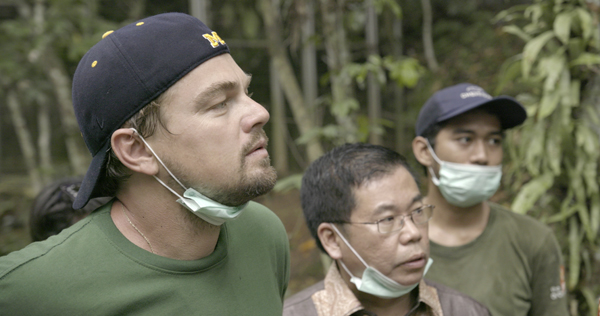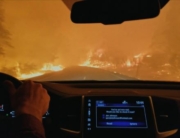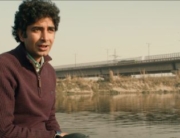Given that Leonardo DiCaprio included a call for action on climate change in his acceptance speech at the 2016 Academy Awards, it’s hardly surprising to find him starring in and producing a documentary on the subject. (He earlier produced and narrated the similarly themed The 11th Hour in 2007.) Shot over the course of two years, after the United Nations named DiCaprio as its messenger of peace on climate change in 2014, the film explores the far-reaching effects of energy consumption and global warming on the planet.
Early on, DiCaprio admits that the more he reads about climate change, tied to human activities such as fossil fuel consumption and deforestation, the more he still has to learn about the subject, and so he embarks upon a global trek that has an ever-expanding scope. As the Earth’s temperature has risen, in places such as Greenland, vast expanses of snow and ice are rapidly melting and washing away. The resulting rise of the ocean level, in turn, causes floods in places like Miami, where the city is spending millions to pump out water, and the central Pacific island of Kiribati, which may be underwater within one generation.
In addition, DiCaprio and crew check out a Canadian oil field reduced to a blackened wasteland, due to oil extraction that releases greenhouse gases. They also bring on experts to discuss such disturbing topics as “carbon bombs,” large amounts of trapped carbon unleashed as rain forests are destroyed. Some of this terrain has doubtlessly been covered by other eco-minded films, but director Fisher Stevens’s procession of scenes paints an increasingly urgent picture of the planet’s current state. There are recurring reminders that the time to act is quickly running out, and through it all, DiCaprio can be seen shaking his head and otherwise lamenting what he sees—a curious and occasionally distracting approach.
Following the trail of carbon production, there is a visit to China and India, two countries considered among the leaders in fossil fuel burning. However, in India, the filmmakers find the answer to the question, “Why don’t you just burn less fossil fuels?” complicated by the human factor. As one activist points out, much of the consumption provides affordable electricity to millions of people living in slums, who would not have access to it otherwise. There is some finger-pointing back in the direction of Americans, for how much electricity we consume as part of our normal lifestyles.
The trips to China and India also reveal that these countries have responded to high pollution levels with increased investment in solar, wind, and other renewable energy sources—to a greater degree, in fact, than many developed nations. Among other inconvenient truths, the film includes footage from 50-year-old public service announcements, indicating that climate change is not a recently discovered threat; as a country, we’ve merely lacked the will to tackle it. DiCaprio and interviewees place the blame squarely on industrialists, such as the Koch Brothers, who have profited handsomely from the status quo. Even today, despite mounting evidence of increasingly extreme weather patterns around the world, these corporations continue a campaign of denial (as depicted in Merchants of Doubt) in order to discredit climate change as a serious issue.
The overall tone is, as previously mentioned, urgent. However, just when it threatens to become hysterical, hope of turning things back from the brink arrives. Possible solutions range from giant, lithium-ion battery-producing factories that would provide enough sustainable energy to get the world off its fossil fuel reliance, down to simply eating more tofu and chicken instead of beef. The film also floats the idea of a carbon tax, which would depend on ordinary citizens not only electing leaders who acknowledge the crisis but continuing to put pressure on politicians to get the tax, and similar measures, passed.
DiCaprio’s passion was integral to getting this thought-provoking, impressively photographed project made, and the film insists on making him a stand-in for the uninitiated viewer, manufacturing what amounts to a personal awakening for him. However, such an arc also seems unnecessary. If the filmmakers had merely enlisted DiCaprio as a narrator, the visual imagery and information would still have been powerful, and important enough, to capture our attention. There also isn’t much in the way of a quest, other than DiCaprio looking for reasons not to despair. The underlying message is that the fate of the entire world and everybody on it rests on what we do in the immediate future. Those are high enough stakes.







Leave A Comment